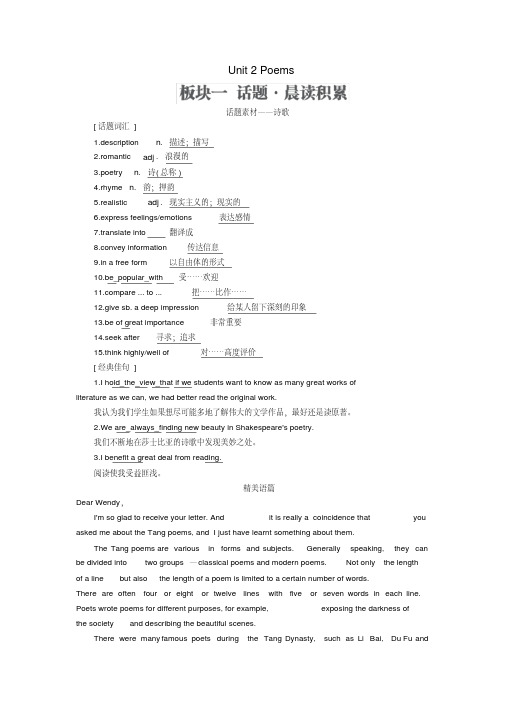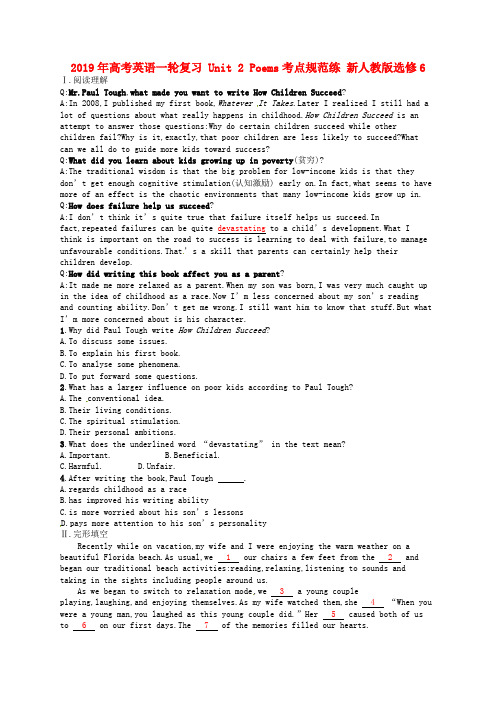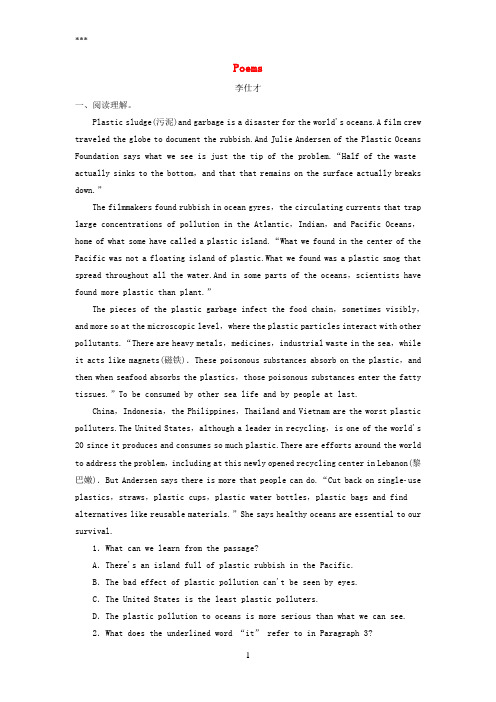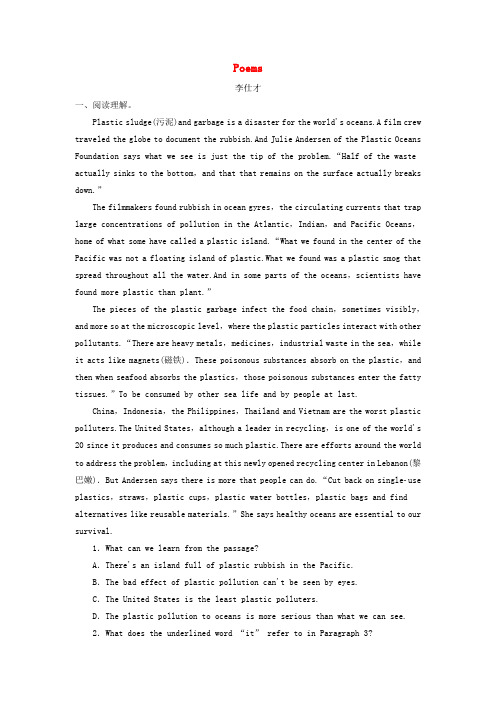2019版高考英语 Unit 2 Poems(词汇考查+词汇应用)(含解析)新人教版选修6
- 格式:doc
- 大小:37.50 KB
- 文档页数:7

Unit 2 Poems话题素材——诗歌[话题词汇]1.description n. 描述;描写2.romantic adj. 浪漫的3.poetry n. 诗(总称)4.rhyme n. 韵;押韵5.realistic adj. 现实主义的;现实的6.express feelings/emotions 表达感情7.translate into 翻译成8.convey information 传达信息9.in a free form 以自由体的形式10.be_popular_with 受……欢迎pare ... to ... 把……比作……12.give sb. a deep impression 给某人留下深刻的印象13.be of great importance 非常重要14.seek after 寻求;追求15.think highly/well of 对……高度评价[经典佳句]1.I hold_the_view_that if we students want to know as many great works ofliterature as we can, we had better read the original work.我认为我们学生如果想尽可能多地了解伟大的文学作品,最好还是读原著。
2.We are_always_finding new beauty in Shakespeare's poetry.我们不断地在莎士比亚的诗歌中发现美妙之处。
3.I benefit a great deal from reading.阅读使我受益匪浅。
精美语篇Dear Wendy,I'm so glad to receive your letter. And it is really a coincidence that you asked me about the Tang poems, and I just have learnt something about them.The Tang poems are various in forms and subjects. Generally speaking, they can be divided into two groups—classical poems and modern poems. Not only the lengthof a line but also the length of a poem is limited to a certain number of words.There are often four or eight or twelve lines with five or seven words in each line. Poets wrote poems for different purposes, for example, exposing the darkness ofthe society and describing the beautiful scenes.There were many famous poets during the Tang Dynasty, such as Li Bai, Du Fu andBai Juyi. If you want to read more, the book 300 Tang Poems is a good choice, which includes poems of many well-known poets. After reading them, you will have a better understanding of the Tang poems.Yours sincerely,Zhang Wei◆高频单词1.poetry (n.) 诗(总称);诗意→poet (n.) 诗人→poem (n.) 诗;韵文2.convey (vt.) 传达;运送→conveyor (n.) 传送者;传输装置3.concrete (adj.) 具体的→abstract (反义词) (adj.) 抽象的4.contradictory (adj.) 引起矛盾的;好反驳的→contradict (v.) 反驳;与……发生矛盾→contradiction (n.) 抵触;矛盾;矛盾的说法5.flexible (adj.) 灵活的;可弯曲的;柔顺的→flexibly (adv.) 灵活地6.tease (vt. & vi.) 取笑;戏弄;招惹→teasingly (adv.) 戏弄地7.salty (adj.) 含盐的;咸的→salt (n.) 盐8.endless (adj.) 无穷的;无止境的→end (v.& n.) 结束;终止9.minimum (n.) 最低限度;最少量;最小数→maximum (反义词) (n.) 最大限度;最大量;最大数10.translation (n.) 翻译;译文→translate (v.) 翻译→translator (n.) 翻译者;译者11.eventually (adv.) 最后;终于→finally (同义词) (adv.)12.transform (vt. & vi.) 转化;转换;改造;变换→transformation (n.) 转化;转换13.sorrow (n.) 悲伤;悲痛;懊悔→sorrowful (adj.) 悲伤的14.bare (adj.) 赤裸的;光秃的;稀少的 (n.) 最基本的要素→barely (adv.) 仅仅;几乎不15.appropriate (adj.) 适当的;正当的→appropriately (adv.) 适当地;正当地16.exchange (vt. & vi.) 调换;交换 (n.) 交换;交流;互换→exchangeable (adj.) 可交换的;可更换的17.warmth (n.) 暖和;温暖→warm (adj.) 暖和的◆重点短语1.make_a_list_of 列……的清单;列……的一览表2.make_sense 有意义;说得通3.on_fire 着火;在燃烧4.stay_up 熬夜,不睡觉;挺立5.take_it_easy 轻松;不紧张;从容6.run_out_of 用完7.be_made_up_of 由……构成8.be popular with 流行;受……欢迎9.in particular 尤其;特别10.by chance 偶然地11.hold on 不挂断12.go for a hike 去远足13.try out 测试;试验14.let out 发出;放走◆热点句型1.way作先行词引导定语从句,从句中不缺主语或宾语时关系词有三种:in which/that/省略;若从句中缺主语或宾语,常用that或whichSome poems tell a story or describe something in a waythat_will_give__the_reader_a_strong_impression (给读者深刻印象的).(教材P10)2.while “然而”表对比Some rhyme (like B) while_others_do_not (然而有些不是这样) (like C).(教材P10)3.状语从句的省略And said though_strange (虽然奇怪) they all were true.(教材P10)4.省略if的虚拟条件句Should_the_traveller_return (旅行者如果归来), this stone would utterspeech.(教材P11)5.with的复合结构作状语With_so_many_different_forms_of_poetry_to_choose_from (有如此多不同类型的诗可以选择), students may eventually want to write poems of their own.(教材P11)◆同步训练在空白处填入1个适当的单词或括号内单词的正确形式。
![[K12学习]2019版高考英语一轮复习Unit2Poems词汇训练新人教版选修6](https://img.taocdn.com/s1/m/c4b29af56f1aff00bed51eca.png)
Unit 2 Poems基础知识默写篇一、分层单词写作词汇1. n.交换;互换;交流vt. & vi.调换;交换2. vt. & vi.转化;变换;转换;改造3. vt.传达;运送4. n.赞助人;主办者;倡议者vt.发起;倡议;举办5. n.负担;负荷物(尤指沉重的)6. n.部分;节;切下的块7. n.悲伤;悲痛;懊悔8. adj.适当的;正当的9. adj.灵活的;可弯曲的;柔顺的10. adv. 永远11. n.空白adj.空白的;茫然的12. adv. 最后;终于阅读词汇1.tease vi. & vt.2.tick vt.3.rhyme n. & vi. & vt.4.branch n.5.nursery n.6.pattern n.7.scholarship n.8.librarian n.9.diploma n.pass n.11.championship n.12.minimum n.13.pianist n.14.violinist n.15.cottage n.16.diamond n.17.bare adj.18.contradictory adj.19.concrete adj.20.salty adj.拓展词汇1. n.翻译;译文→ v.翻译2. adj.无穷的;无止境的→ n. & v.结束3. n.黑暗;漆黑→adj.黑暗的4. n.暖和;温暖→adj.温暖的;暖和的5. adv. 最后;终于→adj.最后的6. n.奖学金; 学问; 学术成就→n.学者7. n.最低限度;最少量;最小数→ n.(反义词)最大限度;最大量8. adj.灵活的;可弯曲的;柔顺的→ n.柔韧性;灵活性9. adj.适当的;正当的→adj.(反义词)不适当的二、高频短语1. 轻松;不紧张;从容2. 用完3. 由……构成4. 讲得通;有意义5. 偶然,碰巧6. be popular with7. try out8. let out9. in particular三、经典句型1.There are various reasons (为什么人们写诗).2.With so many different forms of poetry (可供选择), students may eventually want to write poems of their own.3.And said (虽然离奇)they all were true.4. (如果行人归来), this stone would utter speech.基础知识运用篇一、语境词汇运用(一)词汇拼写(注意单词或短语的形式变化)1.Personally, he is (可能)to attend Mary's wedding.2.With great efforts, I (终于) passed the driving test.3.Online learning resources seem to be (无穷无尽的).4.E-mail has (改变)the way people communicate.5.The exhibition was (举办)by a famous singer.6.My mind was (空白) and I couldn't think of any answer.7.It asks you to act like water:to be (柔韧的) as well as strong.8.This allows them to respond more (合适地) to the user.9.They took a more reasonable approach, (传达) to their children how success at school could improve their lives.10.Don't annoy him! He is (用完)his patience.11.When she saw a snake, she (发出) a cry of horror.12.—I'm sorry I made a mistake!—(放松点). Nobody is perfect.13.His work is to (测试) new designs of cars before they are put on the market.14.One agent recommended a house (尤其).15.Our class (由……组成)52 students, all of whom are friendly and hard-working.16.I met my good friend in the gallery (偶然地).17.You ought to (试用) that radio before you buy it.(二)单句填空1.Jeans and T-shirt are quite (appropriate) for such a visit and I suggest you put on something formal.2.The disabled girl was welcomed when visiting our school for she was a girl with a heart.(warm)3.It was in the lab and we couldn't see much at first, but after a few minutes our eyes got used to the .(dark)4.He works as a and has scores of books from Chinese into English. In addition, his of some great works is popular among foreigners.(translate)5.—The story had a happy . The prince killed the monster and saved the princess in the and they lived happily ever after.—What imagination the writer has! (end)二、经典句型仿写1.尽管累了,但是我们继续工作。

12019版高考英语一轮复习Unit2Poems单元链接高考题型新人教版选修6Unit 2 Poems1 课文与语法填空阅读下面短文,在空白处填入1个适当的单词或括号内单词的正确形式。
People write poetry for various reasons.Some poems tell a story 1 describe something in a way 2 will give the reader a strong impression. 3 (other)try to convey certainemotions.Poets try to express 4 (them)in many different forms of poetry.Nursery rhymes, which 5 (have)strong rhythm and much repetition, are a common type of children's poetry.List poems repeat phrases and some rhyme and students can 6 (easy)write themselves.The cinquain,another simple form of poem, 7 (make)up of five lines.Haiku, 8 Japanese form of poetry,is not a traditional form of English poetry,but it is very popular 9 English writers.English speakers have also shown their great 10 (interesting)in Chinese poems,like T ang poems,many of which have been translated intoEnglish.1. 2. 3. 4. 5.6. 7. 8. 9. 10.2 课文与短文改错根据课文内容,对下面材料进行修改。

2019年高考英语一轮复习 Unit 2 Poems考点规范练新人教版选修6 Ⅰ.阅读理解Q:Mr.Paul Tough,what made you want to write How Children Succeed?A:In 2008,I published my first book,Whatever It ter I realized I still had a lot of questions about what really happens in childhood.How Children Succeed is an attempt to answer those questions:Why do certain children succeed while otherchildren fail?Why is it,exactly,that poor children are less likely to succeed?What can we all do to guide more kids toward success?Q:What did you learn about kids growing up in poverty(贫穷)?A:The traditional wisdom is that the big problem for low-income kids is that they don’t get enough cognitive stimulation(认知激励) early on.In fact,what seems to have more of an effect is the chaotic environments that many low-income kids grow up in. Q:How does failure help us succeed?A:I don’t think it’s quite true that failure itself helps us succeed.Infact,repeated failures can be quite devastating to a child’s development.What Ithink is important on the road to success is learning to deal with failure,to manage unfavourable conditions.That’s a skill that parents can certainly help their children develop.Q:How did writing this book affect you as a parent?A:It made me more relaxed as a parent.When my son was born,I was very much caught up in the idea of childhood as a race.Now I’m less concerned about my son’s reading and counting ability.Don’t get me wrong.I still want him to know that stuff.But what I’m more concerned about is his character.1.Why did Paul Tough write How Children Succeed?A.To discuss some issues.B.To explain his first book.C.To analyse some phenomena.D.To put forward some questions.2.What has a larger influence on poor kids according to Paul Tough?A.The conventional idea.B.Their living conditions.C.The spiritual stimulation.D.Their personal ambitions.3.What does the underlined word “devastati ng” in the text mean?A.Important.B.Beneficial.C.Harmful.D.Unfair.4.After writing the book,Paul Tough .A.regards childhood as a raceB.has improved his writing abilityC.is more worried about his son’s lessonsD.pays more attention to his son’s personalityⅡ.完形填空Recently while on vacation,my wife and I were enjoying the warm weather on a beautiful Florida beach.As usual,we 1 our chairs a few feet from the 2 and began our traditional beach activities:reading,relaxing,listening to sounds and taking in the sights including people around us.As we began to switch to relaxation mode,we 3 a young coupleplaying,laughing,and enjoying themselves.As my wife watched them,she 4 “When you were a young man,you laughed as this young couple did.”Her 5 caused both of us to 6 on our first days.The 7 of the memories filled our hearts.They say 8 look back on life,but we all do.We think about pastrelationships,opportunities,decisions,accomplishments,setbacks,mistakes and more.The key to looking back is not to 9 the past.Recalling life lessons doesn’t have to be negative.There is much to 10 when we see the past through the lens(镜片) of grace,forgiveness and growth.There is 11 in looking back.We can reflect where we have come from and where we are today.Recognize that 12 our imperfections and mistakes,our 13 love us unconditionally.Remember 14 from our setbacks and how they made us 15 .I have learned that looking back,16 done wisely,can offer great insight(领悟) and help us make better decisions.It is not about holding onto our 17 at the expense of our future but 18it.Frederick Douglass,former slave,author and great lea der of his time,said,“We have to do with the past only as we can make it 19 to the present and thefuture.”W hat is the most 20 insight from your past that has impacted your life today?1.A.lost B.madeC.brokeD.put2.A.ocean B.libraryC.parkD.river3.A.imagined B.noticedC.rememberedD.suspected4.A.doubted B.repliedC.statedD.described5.A.advice B.dreamsC.decisionD.words6.A.look back B.look downC.look upD.look out7.A.honour B.painC.joyD.fear8.A.often B.neverC.justD.still9.A.give in B.live inC.give upD.live up to10.A.miss B.spendC.saveD.gain11.A.reason B.goalC.resultD.value12.A.in spite of B.in case ofC.in terms ofD.instead of13.A.partners B.guestsC.parentsD.customers14.A.lessons B.advantagesC.skillsforts15.A.busier B.betterC.quieterD.richer16.A.until B.unlessC.ifD.but17.A.success B.pastC.planD.mistake18.A.forgetting about B.learning fromC.caring aboutD.differing from19.A.stressful B.pitifulC.colo rfuleful20.A.important B.detailedC.popularD.original〚导学号92550066〛Ⅲ.语法填空(2016·成都毕业班第一次诊断性检测)Is “sorry” the hardest word?Not for the British Ed ucation Secretary Michael Gove,1. has apologised recently to his former French teacher 2.his bad behaviour in class.It took him 30 years to express regret.In a letter 3. (publish) in a magazine,e says,“It may be too late to say I’m sorry.But,as my mom told me,it’s never too late to set the record st raight.”Researchers argue that people have too high expectations of the power of saying sorry.Some psychologists say in a study that 4.(receive) an apology isn’t as 5.(help) as people think.Nevertheless,apologies might be an important social tool as they reaffirm(再次确定) the 6.(exist) of rules that need to be observed.Th e Education Secretary’s apology might have been accepted by his old teacher but he might get 7.(h e) into trouble.According to Daily Mail,e’s mother didn’t know her son was causing trouble at school and she 8.(say),“He would have been punished 9. I had known he was being so naughty.”Later,Gove said,“I can never express my apology to him face to face these days—it just goes through to his answering machine.But when I do 10.(eventual) speak to him,I will say sorry.”Ⅳ.短文改错Today I got stick behind a mini bus on the narrow street of my neighbourhood.As I sat there angrily,I had looked up and saw a man.He was wearing an uniform coming out of a house.I could tell that the bus block my way was for him.He turned around and waved goodbye to his very elderly mother whom was watching him from the house.Then,as he was about board the bus,he turned,smiled,and waved at myself.My anger left andtear were rolling as I smiled and waved back.I was late for work but I had the good day ever!I smiled to everyone I saw.##考点规范练27(选修6Unit2)Ⅰ.【解题导语】本文是应用文。

Poems李仕才一、阅读理解。
Plastic sludge(污泥)and garbage is a disaster for the world's oceans.A film crew traveled the globe to document the rubbish.And Julie Andersen of the Plastic Oceans Foundation says what we see is just the tip of the problem.“Half of the was te actually sinks to the bottom,and that that remains on the surface actually breaks down.”The filmmakers found rubbish in ocean gyres,the circulating currents that trap large concentrations of pollution in the Atlantic,Indian,and Pacific Oceans,home of w hat some have called a plastic island.“What we found in the center of the Pacific was not a floating island of plastic.What we found was a plastic smog that spread throughout all the water.And in some parts of the oceans,scientists have found more plastic than plant.”The pieces of the plastic garbage infect the food chain,sometimes visibly,and more so at the microscopic level,where the plastic particles interact with other pollutants.“There are heavy metals,medicines,industrial waste in the sea,while it acts like magnets(磁铁).These poisonous substances absorb on the plastic,and then when seafood absorbs the plastics,those poisonous substances enter the fatty tissues.”To be consumed by other sea life and by people at last.China,Indonesia,the Philippines,Thailand and Vietnam are the worst plastic polluters.The United States,although a leader in recycling,is one of the world's 20 since it produces and consumes so much plastic.There are efforts around the world to address the problem,including at this newly opened recycling center in Lebanon(黎巴嫩).But Andersen says there is more that people can do.“Cut back on singleuse plastics,straws,plastic cups,plastic water bottles,plastic bags and find alternatives like reusable materials.”She says healthy oceans are essent ial to our survival.1.What can we learn from the passage?A.There's an island full of plastic rubbish in the Pacific.B.The bad effect of plastic pollution can't be seen by eyes.C.The United States is the least plastic polluters.D.The plastic pollution to oceans is more serious than what we can see.2.What does the underlined word “it” refer to in Paragraph 3?A.Pollutants like heavy metals and medicines.B.The plastic particles.C.Seafood.D.Fatty tissues.3.What can be inferred from the last paragraph?A.All Asian countries have the most serious problem of plastic pollution.B.The plastic problem hasn't attracted the world's attention.C.Andersen is not satisfied with what has been done to solve the plastic problem.D.People should stop using plastic products immediately.4.Which may be the title of the passage?A.Plastic pollution in the WorldB.Plastic pollution—Oceans' DisasterC.Ways to solve the problem of plastic pollution to oceansD.Plastic pollution and our health【解题导语】本文是一篇说明文。

Poems李仕才一、阅读理解。
Plastic sludge(污泥)and garbage is a disaster for the world's oceans.A film crew traveled the globe to document the rubbish.And Julie Andersen of the Plastic Oceans Foundation says what we see is just the tip of the problem.“Half of the waste actually sinks to the bottom,and that that remains on the surface actually breaks down.”The filmmakers found rubbish in ocean gyres,the circulating currents that trap large concentrations of pollution in the Atlantic,Indian,and Pacific Oceans,home o f what some have called a plastic island.“What we found in the center of the Pacific was not a floating island of plastic.What we found was a plastic smog that spread throughout all the water.And in some parts of the oceans,scientists have found more plast ic than plant.”The pieces of the plastic garbage infect the food chain,sometimes visibly,and more so at the microscopic level,where the plastic particles interact with other pollutants.“There are heavy metals,medicines,industrial waste in the sea,while it acts like magnets(磁铁).These poisonous substances absorb on the plastic,and then when seafood absorbs the plastics,those poisonous substances enter the fatty tissues.”To be consumed by other sea life and by people at last.China,Indonesia,the Philippines,Thailand and Vietnam are the worst plastic polluters.The United States,although a leader in recycling,is one of the world's 20 since it produces and consumes so much plastic.There are efforts around the world to address the problem,including at this newly opened recycling center in Lebanon(黎巴嫩).But Andersen says there is more that people can do.“Cut back on singleuse plastics,straws,plastic cups,plastic water bottles,plastic bags and find alternatives like reusable materials.”She says healthy oceans are ess ential to our survival.1.What can we learn from the passage?A.There's an island full of plastic rubbish in the Pacific.B.The bad effect of plastic pollution can't be seen by eyes.C.The United States is the least plastic polluters.D.The plastic pollution to oceans is more serious than what we can see.2.What does the underlined word “it” refer to in Paragraph 3?A.Pollutants like heavy metals and medicines.B.The plastic particles.C.Seafood.D.Fatty tissues.3.What can be inferred from the last paragraph?A.All Asian countries have the most serious problem of plastic pollution.B.The plastic problem hasn't attracted the world's attention.C.Andersen is not satisfied with what has been done to solve the plastic problem.D.People should stop using plastic products immediately.4.Which may be the title of the passage?A.Plastic pollution in the WorldB.Plastic pollution—Oceans' DisasterC.Ways to solve the problem of plastic pollution to oceansD.Plastic pollution and our health【解题导语】本文是一篇说明文。
Unit 2 Poems一、刷黑板——词汇全听写先过识记默写关Ⅰ.阅读词汇(英译汉)[第一屏听写]1.nursery n.托儿所2.rhythmic adj.有节奏的;有规律的3.contradictory adj.引起矛盾的;好反驳的4.diamond n. 钻石;菱形5.cottage n. 村舍;小屋6.sparrow n. 麻雀[第二屏听写]7.minimum n.最低限度;最少量;最小数8.compass n. 指南针;罗盘;(复数)圆规9.bride n. 新娘10.bridegroom n. 新郎11.emotion n. 情感;情绪;感情12.repetition n. 重复;反复;循环13.nursery rhyme 童谣Ⅱ.高频词汇(汉译英)[第三屏听写]1.poetry n.诗(总称);诗意2.tick vt.给……标记号3.convey vt.传达;运送4.rhyme n. 韵;押韵;押韵的词vi.&vt.(使)押韵5.concrete adj.具体的6.flexible adj.灵活的;可弯曲的;柔顺的[第四屏听写]7.pattern n.模式;式样;图案8.tease vi.&vt.取笑;招惹;戏弄9.salty adj.含盐的;咸的10.endless adj.无穷的;无止境的11.translation n. 翻译;译文12.branch n. 枝条;支流;部门13.transform vi.&vt.转化;转换;改造;变换[第五屏听写]14.sorrow n.悲伤;悲痛;懊悔15.bare adj.赤裸的;光秃的;稀少的n. 最基本的要素16.librarian n. 图书馆馆长;图书馆管理员17.forever adv. 永远18.appropriate adj.适当的;正当的[第六屏听写] 19.exchange n.交换;交流;互换vt.&vi.调换;交换20.diploma n. 毕业文凭;学位证书21.sponsor n. 赞助人;主办者;倡议者vt.发起;举办;倡议22.blank n. 空白adj.空白的;茫然的[第七屏听写] 23.eventually adv. 最后;终于24.championship n. 冠军称号25.section n. 部分;节;切下的块26.darkness n. 黑暗;漆黑27.warmth n. 暖和;温暖28.scholarship n. 奖学金;学问;学术成就29.pianist n. 钢琴家;钢琴演奏者[第八屏听写]30.violinist n.小提琴演奏者31.load n. 负担;负荷物(尤指沉重的) 32.try_out 测试;试验33.let_out 发出;放走34.take_it_easy 轻松;不紧张;从容35.run_out_of 用完36.in_particular 尤其;特别37.be_made_up_of 由……构成二、刷清单——热身自盘点再过基本应用关(一)核心单词阅读单词1.nursery n.托儿所2.contradictory adj.引起矛盾的;好反驳的3.diamond n. 钻石;菱形4.cottage n. 村舍;小屋5.sparrown.麻雀6.compass n.指南针;罗盘;(复数)圆规7.bride n. 新娘8.bridegroom n.新郎9.repetitionn.重复;反复;循环10.emotion n. 情感;情绪;感情11.minimum n. 最低限度;最少量;最小数表达单词1.tease vi. & vt.取笑;招惹;戏弄2.forever adv. 永远3.flexible adj.灵活的;可弯曲的;柔顺的4.branch n. 枝条;支流;部门5.exchange n. 交换;交流;互换vt. & vi.调换;交换6.sponsor n. 赞助人,主办者;倡议者vt.发起;举办;倡议7.eventually adv. 最后;终于8.load n. 负担;负荷物(尤指沉重的)9.convey vt.传达;运送10.tick vt.给……标记号11.pattern n. 模式;式样;图案12.section n. 部分;节;切下的块13.diploma n. 毕业文凭;学位[语境活用]1.They said it was such a beautiful daythat they would remember it forever (永远).2.I was constantly teased(取笑) forbeing heavier than the other kids,leaving me feeling shy and sad.3.A wellchosen mouse is really handy,flexible (灵活的) and convenient incontrolling the screen.4.We often exchanged (交换) learningexperience, so I know clearly why hewas able to achieve such a success.5.In my opinion, if you are devoted toyour study, you will not feel likesmoking eventually (最后).6.The burden of students has been a hottopic for years, but the load (负担) ofparents has received little attention,especially from their own children.7.That night, he completed the firstsection (部分) of his poem.(二)常用短语return, this stone would utterspeech.行人归来石应语。
Unit 2 李仕才 一、词汇复习 (一)单句语法填空 1. ane's grandmother had wanted to write ________ children's book for many years,
but one thing or another always got in ________ way. 答案:a;the 句意:简的祖母多年来一直想写一本儿童读物,但是一件接一件的事情总是妨碍她写书。children's book的中心词是单数可数名词且第一次出现,并且此处表泛指,故其前需加不定冠词;in the way为固定搭配,意为“挡道,碍事”。 2.(2014·新课标Ⅰ,63)Now, years later, this river is one of ________ most outstanding examples of environmental cleanup. 答案:the 形容词最高级前用定冠词。句意:现在,数年之后,这条河是环境保护最典型的例子之一。空格后部分的中心词是名词examples,再由one of...可知,这里的most表示比较意义;形容词最高级前用定冠词the。 3.(2014·广东,23改编)She apologized for the mistake and gave us a spare VIP room on ________ top floor. 答案:the top“顶端的,最高的”,只修饰名词,前面用定冠词。on the top floor “在顶楼”。 4.(2014·天津,8改编)Life is like ________ ocean: Only ________ strongwilled can reach the other shore. 答案:an;the 第一个空表示泛指,且ocean以元音音素开头,故用不定冠词an;形容词前用定冠词表示一类人,the strongwilled意为“意志坚强的人”。 5.(2014·浙江,2改编)The paper is due next month, and I am working seven days ________ week, often long into________night. 答案:a;the seven days a week意为“整个星期,一周七天”,long into the night意为“直到深夜”,是固定短语。 (二)英汉互译 1. △poetry n. __________ 2. tick vt. __________ 3. rhyme n. vi. & vt. __________ 4. convey vt. __________ 5. △emotion n. __________ 6. nursery n. __________ 7. nursery rhyme __________ 8. concrete adj. __________ 9. △repetition n. __________ 2
10. contradictory adj. __________ 11. △hush vi. &vt. __________ 12. △mockingbird n. __________ 13. diamond n. __________ 14. △brass n. __________ 15. △billy-goat n. __________ 16. flexible adj. __________ 17. pattern n. __________ 18. △squire n. __________ 19. cottage n. __________ 20. △coffin n. __________ 21. sparrow n. __________ 22. △kitten n. __________ 23. tke it easy __________ 24. run out of __________ 25. △cinquain n. __________ 26. be made up of __________ 27. tease vi. & vt. __________ 28. salty adj. __________ 29. △droop vi. __________ 30. △dread vi. & vt. __________ 31. endless adj. __________ 32. △haiku n. __________ 33. △syllable n. __________ 34. minimum n. __________ 35. translation n. __________ 36. branch n. __________ 37. △melt (melted; melted, molten) vi. __________ 38. △brimful adj. __________ 39. in particular __________ 40. eventually adv. __________ 41. △await vt. __________ 42. transform vi. & vt. __________ 43. △revolve vi. & vt. __________ 44. △utter vt. __________ 45. sorrow n. __________ 46. bare adj. n. __________ 47. librarian n. __________ 48. forever adv. __________ 49. △stem n. __________ 50. △cement n. __________ 51. section n. __________ 52. appropriate adj. __________ 53. exchange n. vt. & vi. __________ 3
54. diploma n__________. 55. sponsor n. vt. __________ 56. blank n. adj. __________ 57. compass n. __________ 58. bride n. __________ 59. bridegroom n. __________ 60. championship n. __________ 61. △rhythmic adj. __________ 62. darkness n. __________ 63. warmth n. __________ 64. try out __________ 65. scholarship n. __________ 66. pianist n. __________ 67. violinist n. __________ 68. let out __________ load n. __________ 二、完形填空 I was looking through some old photo albums the other day.I had __1__ done that
many times before but I felt a sudden __2__ to see them again.I found myself __3__ so many beautiful memories from my childhood.There was my dear Nana giving me a thorough __4__ when I was a newborn baby.There was me and my brother standing in front of the world's ugliest __5__ our favorite Christmas tree.There was my beautiful Mom __6__ me on her lap.Then the pictures seemed __7__ all of a sudden because my eyes were wet.I just couldn't __8__ the tears.“What is going on?” I __9__.I hadn't cried the last time.But what was __10__ now? I soon saw that it was I who changed.I had __11__.My spirit had walked a little further down the __12__ of love.I realized as long as they came with a warm heart,wet eyes were __13__ to be ashamed of.I smiled and I felt Mom and Nana smiling __14__ on me from Heaven. Leo Buscaglia said:“I'm not afraid of __15__.They clean out my eyeballs.” I think they clean out our __16__ as well.They help us to wash away our pain, fear and grief(悲伤).They help us to __17__ our love and goodness.They help us to become who we are __18__ to be.The next time you feel your tears starting,just let them __19__. Life is full of smiles and tears.Only by allowing them both can we __20__ live. 1.A.never B.ever C.already D.nearly 2.A.appeal B.sadness